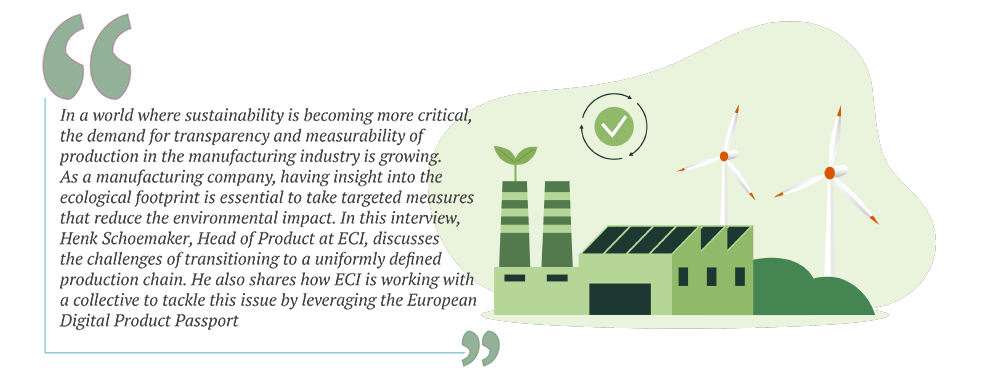THE CO2 FOOTPRINT


The increasing awareness of man-made climate change is leading to stricter laws and regulations aimed at promoting sustainability. ESG (Environmental, Social, and Governance) has been introduced and further developed as a response. This European legislation focuses on measuring sustainability, social impact, and governance.
Specifically for the manufacturing industry, companies must record data on CO2 emissions, the origin of raw materials, and working conditions to enable the traceability of fair production. Large OEMs such as Philips and ASML will be required to comply with the law from 2024. However, Henk explains that the movement towards compliance still presents a significant obstacle.
Uniformity of data
Following the implementation of stricter ESG law, the first major suppliers of a final product must be able to report the required production data of all links in the supply chain to ESG. The delivery of an end product results from the collaboration between different production companies, each of which has played its role but together contributes to the stated sustainability performance. In an ideal world, companies within the supply chain exchange the required information digitally so that the supplier of the end product does not have to make extra efforts to combine this information for a degree of sustainability. However, the reality is that uniformly automated data capture is proving to be the biggest challenge in pursuing compliance with legislation. “The diversity of companies within the chain ensures different ways of recording and reporting data, for example, via Excel or Word templates. This makes it difficult to merge different formats unambiguously and report fully and correctly to ESG,” says Henk. It is, therefore, necessary to introduce a system in which data exchange takes place in an automated way so that the digital footprint, according to the supply chain, is increasingly enriched with the required ESG information, or as the term speaks better for itself: the European Digital Product Passport.

The European Digital Product Passport
The NXTGEN HIGHTECH Growth Fund subsidises digital projects to keep Europe’s manufacturing sector at the forefront. It comprises a selection of forward thinking firms in the industry, with the European Digital Product Passport being a major assigned initiative. In cooperation with the SCSN (Smart Connected Supply Network) foundation, research is currently being conducted to evaluate whether the prevailing network in the Netherlands could be harnessed to improve the European Digital Product Passport.
As it stands, SCSN is already integrated with all types of ERP platforms on the market, making it appropriate for the transmission of ‘purchase to pay’ data. Crucially, much of the info that needs to be provided in such a passport can be obtained from ERP software. Furthermore, an ERP link forms the foundation of the so-called digital highway for data transfer. In this way, all contributing suppliers’ product passports can be appended to the passport of the supplier of the end product. According to Henk, a significant technological advance is within reach by taking advantage of the existing ERP systems and the SCSN infrastructure in such a pioneering way. This could offer a completely automated solution to an accounting and legal challenge.
Want to know more?
ECI supports companies in the manufacturing industry to automate business processes, and in addition to various ERP software, offers access to the digital highway via ECI Gatewise.
Would you, as a manufacturing company, like to learn more about further developing this SCSN-network to build the European Digital Product Passport in the future?
Feel free to contact us at
Tel: +31 (0)88 63 63 910 or via
E-mail: nl-bdr@ecisolutions.com.

